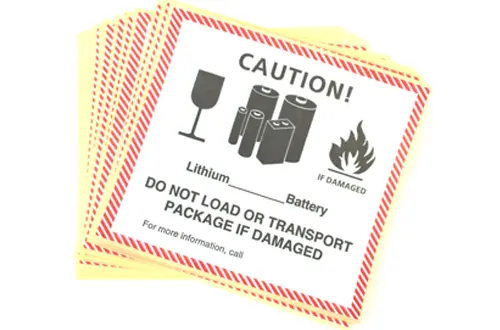Cross-border Customs Requirements for Battery Transportation
There may be certain safety risks during transportation of batteries, such as short circuit, leakage, fire or explosion, etc. Cross-border customs requirements for battery transportation have also become stricter.
What are the potential risks of batteries during transportation?
Fire and explosion risk
Lithium-ion batteries have strict requirements on ambient temperature. Excessively high temperatures may cause the battery to burn or even explode. At the same time, low temperature will also affect battery performance.

Lithium-ion batteries, in particular, pose a risk of fire and explosion if they are damaged, short-circuited, overcharged, or exposed to extreme temperatures during transportation. The flammable electrolyte and reactive materials inside the battery may ignite under certain conditions.
physical damage
Batteries are prone to physical damage such as squeezing, collision or falling during transportation, which can lead to problems such as rupture of battery packaging and short circuit of electrodes.
Physical damage to the battery during transportation (such as puncture, crushing, or impact) may cause an internal short circuit. This can lead to rapid energy release, thermal runaway, etc.
battery leak
If the battery is damaged or defective, corrosive or toxic chemicals may leak. For example, lead-acid batteries contain sulfuric acid, which can cause environmental pollution and pose health risks if leaked during transportation.
temperature conditions
External factors such as sunlight, poor ventilation, or stacked packaging can cause batteries to overheat during transportation. Excessive heat accelerates chemical reactions within the battery and increases the risk of fire or thermal runaway.
Batteries are sensitive to temperature fluctuations. Exposure to extreme heat or cold during transportation can affect battery performance, shorten its lifespan, and in some cases, cause battery failure or failure.
Dangerous Goods Transport Regulations
Batteries are classified as dangerous goods and require specific transportation regulations, such as the use of special safety transport boxes.
regulatory compliance issues
Failure to comply with shipping regulations and guidelines regarding battery packaging, labeling, documentation, and handling may result in fines, penalties, delays, and even denial of shipment at customs checkpoints.
environmental impact
Improper handling of damaged or expired batteries during transportation can lead to environmental pollution. Batteries contain heavy metals and other harmful substances that can contaminate soil, water and air if not properly handled and disposed of.
To mitigate these risks, it is important to follow industry best practices and ensure strict compliance with appropriate packaging, labeling and shipping practices.
Cross-border customs requirements for battery shipments can vary widely depending on factors such as battery type, capacity, mode of transport, and the specific regulations of the country in question.
General customs guidelines for battery shipments
Battery classification
Different types of batteries (e.g., lithium-ion, lead-acid, nickel-metal hydride) may be subject to different regulations. For example, lithium batteries typically have stricter regulations due to potential fire risks. Classification based on battery type and characteristics. This helps determine appropriate shipping requirements and measures.
Battery safety performance test
Batteries need to pass a series of safety performance tests, such as short circuit test, overcharge and overdischarge test, high temperature test, etc., to prove their safety during transportation.
Packaging and labeling
Batteries must be packaged and labeled according to international standards, such as those set by the International Air Transport Association (IATA) and the International Maritime Dangerous Goods (IMDG) rules. This ensures safe handling and shipping.
Packaging must protect the battery from crushing, impact, or vibration during transportation. The packaging also needs to indicate the battery type, quantity, weight and other information, and provide necessary warning labels.
Transportation method selection
Depending on the type and quantity of batteries, customs may require a specific shipping method, such as sea, air or land transportation. Certain batteries may not be allowed in certain modes of transportation due to higher safety risks.
Quantitative restrictions
There may be limits on the number of batteries that can be transported at one time, especially lithium batteries. These limits are typically based on battery capacity and may vary based on shipping method.
special license or permit
Depending on the type and quantity of batteries being transported, you may need a special license or permit from the relevant agency. These licenses ensure you have the authority to transport hazardous materials safely.
Filing and documentation requirements
Battery transportation requires detailed declaration information, including battery type, quantity, weight, destination, etc. At the same time, relevant supporting documents are also required, such as battery performance test reports, safety certification certificates, etc. This may include invoices, shipping lists, safety data sheets (SDS) and certificates of origin.
Risk Assessment
Conduct a thorough risk assessment to identify potential hazards associated with battery transportation and implement appropriate risk mitigation measures.
Customs requirements for battery transportation may vary in different countries and regions. Therefore, when transporting batteries across borders, it is important to understand and comply with the relevant laws and regulations of the destination country. At the same time, it is recommended to cooperate with professional logistics companies and customs agents to ensure the smooth progress of battery transportation.
Shopv logistics and transportation service providers know the importance of lithium battery shipping. For users who need to send lithium batteries, it is crucial to choose a professional and reliable logistics and transportation service provider.
With the help of Shopv logistics and transportation service provider, users can easily solve the problem of sending lithium batteries. Whether it's a small lithium battery or a large battery pack, Shopv can provide a safe and efficient transportation solution. They use packaging materials that comply with regulations to ensure that lithium batteries will not be damaged or cause danger during transportation. At the same time, they also provide full tracking services to allow users to understand the transportation status of lithium batteries at any time.










